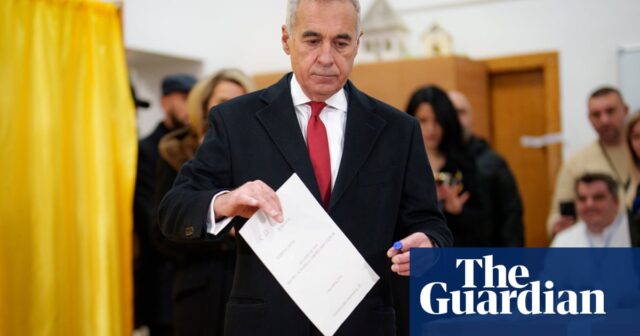Voting is under way in parliamentary elections in Romania, with voters still unsure whether the shock result of last week’s presidential first-round ballot will stand amid continuing allegations of electoral fraud and foreign interference.
Far-right parties are forecast to make significant gains in Sunday’s parliamentary vote, with polls showing the nationalist Alliance for the Union of Romanians (AUR) slightly ahead of the Social Democratic party (PSD), part of the ruling coalition.
The election comes a week after Călin Georgescu, a far-right, Moscow-friendly independent who had previously been polling at barely 5%, finished first in the opening round of the presidential vote, an outcome that upended Romanian politics.
Georgescu’s unexpected success, after a campaign which he said had zero financing but was based heavily on viral TikTok videos, reportedly boosted by bot-like activity, has triggered nightly protests and aroused suspicions of external interference.
The country’s top court ordered a recount and is due on Monday to announce its decision on a request by a defeated candidate to annul it altogether over allegations of illegal electoral activity by the party of the second-placed candidate, Elena Lasconi.
As things stand, Georgescu should face Lasconi in a second-round runoff on 8 December but, depending on the court’s decision, both presidential votes could be delayed until later this month, adding to the country’s political uncertainty.
Both elections are seen as critical to the future direction of Romania, hitherto a reliable EU and Nato ally, strategically important for western support for Ukraine, which has largely evaded nationalism since emerging from communism in 1989.
“People who have serenely voted for Georgescu do not realise we are essentially talking about a total trajectory shift,” the political scientist Cristian Pîrvulescu said.
Amid widespread voter anger over the cost of living and a long legacy of political corruption, analysts said far-right parties such as the AUR were likely to benefit most from the turmoil, which has further tarnished public trust in state institutions.
“The net beneficiaries … are Georgescu and the anti-establishment camp, which is now getting additional ammunition: here is how state institutions work, how discretionary they are,” said Sergiu Mișcoiu, of Babeș-Bolyai University.
Voters echoed that view. “What’s going on now doesn’t seem very democratic,” Gina Visan, a 40-year-old nurse, told Agence-France Presse. “They should respect our vote. We’re disappointed, but we’re used to this kind of behaviour.”
Polls late last week put the AUR on about 22%, with the PSD of the outgoing prime minister, Marcel Ciolacu, on about 21% – down sharply since the presidential ballot – and Lasconi’s centre-right, pro-EU Save Romania Union (USR) on 17%.
Many observers believe the country’s political landscape is about to shift sharply to the anti-establishment right. Romania has the EU’s biggest share of people at risk of poverty, the bloc’s highest inflation rate and its largest budget deficit.
“The impact of presidential election surprise will be significant – we are going to wake up in a new political reality,” said the political analyst Cristian Andrei. “Georgescu voters will speak again and reshape how we look at Romania’s political spectrum.”
after newsletter promotion
The outgoing president, Klaus Iohannis, said Sunday’s vote would determine Romania’s future: whether it would “remain a country of freedom and openness, or collapse into toxic isolation and a dark past”.
The centre-left PSD and centre-right National Liberal party (PNL) have dominated Romania’s politics for the past three decades, but most observers foresee a much more fragmented landscape, making it increasingly hard to form a coalition.
Both the party of Young People (POT), founded in 2023, which has thrown its support behind Georgescu, and the extreme-right SOS Romania, led by firebrand Diana Sosoaca, could reach the 5% threshold to enter parliament.
Romania’s presidential office said last week officials had detected online efforts to influence voting, adding that one first-round candidate had benefited from “massive exposure due to preferential treatment” by the social media platform TikTok.
TikTok has dismissed the allegations, saying it enforces guidelines against election misinformation. A spokesperson on Thursday said it was “categorically false” to suggest Georgescu’s account was treated differently from those of other candidates.
Georgescu has called for an end to the war in Ukraine, denied the existence of Covid-19, described two second world war-era Romanian fascists as “national heroes” and claimed that in foreign affairs Romania would benefit from “Russian wisdom”.
Romanians are voting to elect lawmakers in both the senate, which has 133 seats, and parliament, which has 323. Polling stations opened on Sunday at 7am and will close at 9pm local time, with exit polls due soon afterwards.






